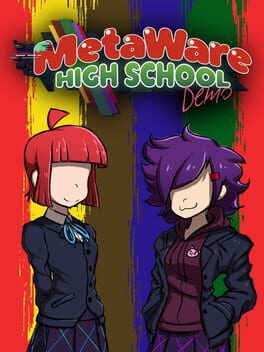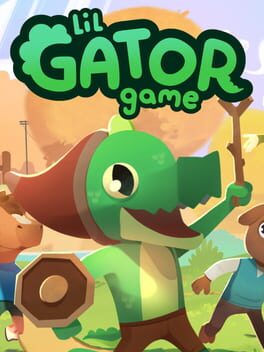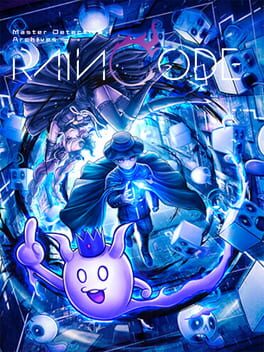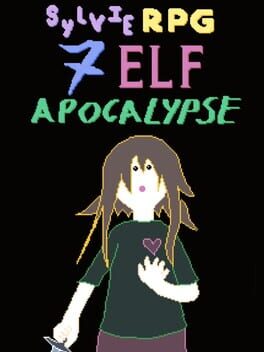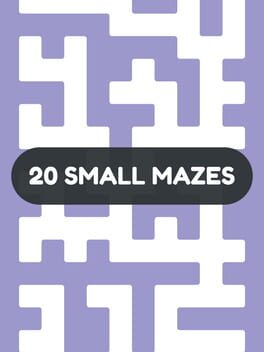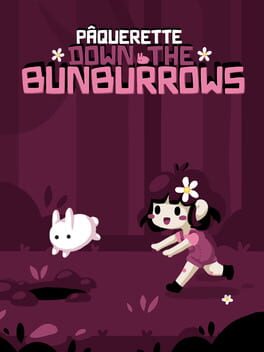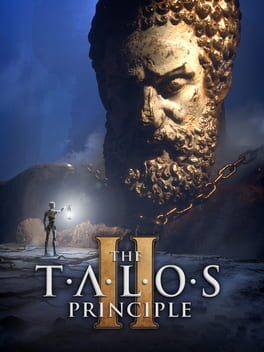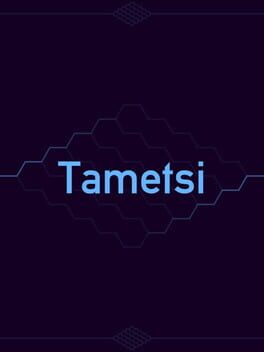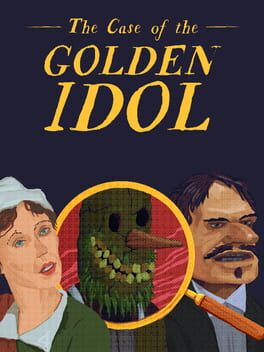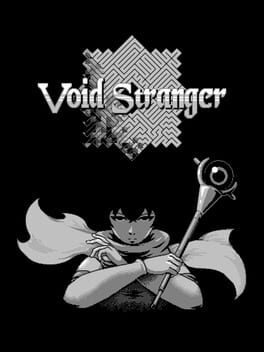lukebee
Found out about this game through its inclusion in SiIvaGunner's absolutely incredible Shop Fusion Collab video game music mashup video, and finally got around to playing it myself since it's included in the ongoing (at time of writing) Palestinian Relief Bundle on itch. (The game itself is free anyway but the included soundtrack, artbook, and other extras are not.)
First things first, despite the title, this is a standalone experience. My first point of comparison would be The Stanley Parable Demonstration, since they're both very meta games where characters break the 4th wall to "demo" their game for you, only there is a real The Stanley Parable that TSP Demonstration exists to sell you on, whereas MetaWare High School (Demo) exists purely for its own sake (though the creator has expressed interest in doing more with MetaWare in some form eventually.)
Anyway, the conceit of the game is that it's a visual novel where the characters (and indeed, everyone in their world) are aware that they are inhabitants of a visual novel, or more specifically, of a demo of some hypothetical "full version" of their visual novel, which leads to jokes about unfinished assets and characters panicking about needing to not waste time because demos are short and so on. What the characters aren't sure of is what exactly their visual novel is supposed to be about (in particular, there's some division over whether it's a dating sim or not), and while they never get any concrete answers, in practice the meat of the game is simply in the varying attitudes of the characters towards the artificial and unfinished nature of their existence and their reactions to the presence of the player that their reality exists in service of. I'm a sucker for this kind of existential meta stuff, so I found it all pretty interesting. It's also just a very funny game; I especially enjoyed the game's habit of treating its own presentation hyper-literally, which leads to a bunch of absurd gags, most notably around the stylistic choice to draw the characters without eyes.
First things first, despite the title, this is a standalone experience. My first point of comparison would be The Stanley Parable Demonstration, since they're both very meta games where characters break the 4th wall to "demo" their game for you, only there is a real The Stanley Parable that TSP Demonstration exists to sell you on, whereas MetaWare High School (Demo) exists purely for its own sake (though the creator has expressed interest in doing more with MetaWare in some form eventually.)
Anyway, the conceit of the game is that it's a visual novel where the characters (and indeed, everyone in their world) are aware that they are inhabitants of a visual novel, or more specifically, of a demo of some hypothetical "full version" of their visual novel, which leads to jokes about unfinished assets and characters panicking about needing to not waste time because demos are short and so on. What the characters aren't sure of is what exactly their visual novel is supposed to be about (in particular, there's some division over whether it's a dating sim or not), and while they never get any concrete answers, in practice the meat of the game is simply in the varying attitudes of the characters towards the artificial and unfinished nature of their existence and their reactions to the presence of the player that their reality exists in service of. I'm a sucker for this kind of existential meta stuff, so I found it all pretty interesting. It's also just a very funny game; I especially enjoyed the game's habit of treating its own presentation hyper-literally, which leads to a bunch of absurd gags, most notably around the stylistic choice to draw the characters without eyes.
2024
A lovely little first-person puzzle game about working out the optimal conditions needed to make different types of flowers bloom. I found it a bit on the easy side, and I’m not sure how I feel about the decision to not let you freely view any clues you found (instead forcing you to track them down all over again once you’ve worked out what information you need), but I enjoyed my time with it. I particularly liked that despite the relaxed, cozy, Wholesome Games-ness of it all, the narrative had some unexpected bite to it in the form of some infuriatingly condescending 19th century misogyny.
2022
Lil Gator Game is basically what you would get if you took A Short Hike (short and cute hazard-free 3D platformer on an island with anthropomorphic animals, Breath of the Wild’s climbing mechanics, an optional pixelated graphics filter, and an ending that wants to tug at your heartstrings a lil bit) and added like 20% more BOTW to it in the form of a sword and shield (though the “enemies” are all harmless cardboard standees), shield-surfing (complete with front-flip animation), a “glider”, and theming the game as a bunch of kids’ attempt to play make-believe Zelda in real life. Thankfully, I really liked A Short Hike, so even though this was mostly just more of that (albeit from a different developer), I had a great time playing this to completion in one sitting.
I'm very much of two minds about this latest murder-mystery adventure game from Danganronpa creator Kazutaka Kodaka; there's a lot I actively disliked and I had a pretty low opinion of the game for a good amount of my playthrough, but when things finally kicked into high gear in the last couple chapters, I basically found myself totally won over and was suddenly having a great time with it.
On the one hand, some of the character writing can be pretty grating (Desuhiko's whole wannabe playboy shtick and Shinigami constantly saying things like "boom-kill" and "mysteriful" and repeatedly referring to a teenage girl as "flatty" are the worst offenders), the pacing really drags in the middle to the point where I was pretty bored for a lot of chapters 2 and 3, and the game runs pretty terribly on Switch, with frequent and lengthy loading screens.
On the other hand though, the presentation is top notch, Masafumi Takada killed it with the soundtrack as always, and like I said before, the last couple chapters were so good that they completely turned around my opinion of the game. The final reveals were actually really interesting (and way more fucked up than I was expecting), and there's one tidbit in particular that's such a clever play on audience expectations (especially if you're familiar with Danganronpa) that it genuinely had me cackling when it was revealed.
Basically what I'm saying is, I do recommend this game, but only if you have the patience and tolerance to slog through many uneven hours to get to the best parts. I found the experience extremely worthwhile in the end, but your mileage may vary.
On the one hand, some of the character writing can be pretty grating (Desuhiko's whole wannabe playboy shtick and Shinigami constantly saying things like "boom-kill" and "mysteriful" and repeatedly referring to a teenage girl as "flatty" are the worst offenders), the pacing really drags in the middle to the point where I was pretty bored for a lot of chapters 2 and 3, and the game runs pretty terribly on Switch, with frequent and lengthy loading screens.
On the other hand though, the presentation is top notch, Masafumi Takada killed it with the soundtrack as always, and like I said before, the last couple chapters were so good that they completely turned around my opinion of the game. The final reveals were actually really interesting (and way more fucked up than I was expecting), and there's one tidbit in particular that's such a clever play on audience expectations (especially if you're familiar with Danganronpa) that it genuinely had me cackling when it was revealed.
Basically what I'm saying is, I do recommend this game, but only if you have the patience and tolerance to slog through many uneven hours to get to the best parts. I found the experience extremely worthwhile in the end, but your mileage may vary.
Cute little secret-filled action-RPG built around a "7 game" limitation: the tiles are 7x7 pixels, the screens are 7x7 tiles, the world is 7x7 screens, and the level cap is 7. I really liked the way shields work: they give you a flat amount of damage reduction, which given the low numbers the game is working with means that often you can completely negate attacks, but every time you get hit you drop the shield and have to go chase it down to pick it up again while completely vulnerable.
2024
A collection of creative maze puzzles, each with some unique mechanic or gimmick. I especially liked the interface (rather than progressing directly from one maze to the next or selecting them from a menu, the mazes are all on-screen at once in overlapping draggable windows) and how it ties into a few of the puzzles. Short, sweet, and free.
2023
A simultaneously brain-melting and brain-expanding puzzle game about manipulating and corralling rudimentary pathfinding AIs that hides shocking levels of complexity beneath its cutesy exterior and simple early stages. I don’t want to spoil the specifics but there are some discoveries that massively expand the scope and possibility space of the game to a genuinely overwhelming degree—to the point that I consider everything up until the credits roll to still be part of the tutorial.
If I had one complaint (though I believe there are plans to improve this), it’s that I wish there was more clarity on which [REDACTED] are actually possible, since it’s currently all too easy to spend ages trying to puzzle out something that can’t actually be done. For my part, my brother and I looked up a list of all known [REDACTED] and put together a spreadsheet to track the ones we’d managed to find, which made the whole process actually manageable while still being plenty challenging (and then my brother did even more spreadsheet crimes to help us figure out the most promising possibilities for a certain achievement).
In any case, I’m really looking forward to both the promised free additions to the game and the upcoming DLC—I’m so ready for them to finally do something with [REDACTED]!
If I had one complaint (though I believe there are plans to improve this), it’s that I wish there was more clarity on which [REDACTED] are actually possible, since it’s currently all too easy to spend ages trying to puzzle out something that can’t actually be done. For my part, my brother and I looked up a list of all known [REDACTED] and put together a spreadsheet to track the ones we’d managed to find, which made the whole process actually manageable while still being plenty challenging (and then my brother did even more spreadsheet crimes to help us figure out the most promising possibilities for a certain achievement).
In any case, I’m really looking forward to both the promised free additions to the game and the upcoming DLC—I’m so ready for them to finally do something with [REDACTED]!
A decently enjoyable puzzle game that just didn’t manage to fully pull me in. The environments are gorgeous, but they’re also frequently a pain to navigate. (Why does fast travel only work from the shuttle?) The story is intellectually interesting and the voice actors do a solid job (I was impressed by the wide variety of accents on display), but I never felt particularly emotionally invested, and even though the characters do have distinct personalities they wound up feeling first and foremost like mouthpieces for their respective philosophical positions. And as for the puzzles themselves, I generally had a good time solving them and there were some that I found particularly clever, but for the most part they just didn’t hit the highs of my favorite puzzle games.
2020
As someone who plays a lot of 5e, I had a blast with this video game adaptation, especially when I was curb-stomping bosses using ridiculously overpowered builds no DM would ever let me get away with. (Spell slots and long rests are for suckers, who needs them when you can kill even a dragon with just two rounds of cantrips and crossbow bolts?) It’s a wildly ambitious, occasionally broken mess of a game whose moments of extreme frustration (like having to restart the final boss fight after discovering that disguising my character inexplicably locked me out of triggering the 2nd phase) did little to change the fact that it’s otherwise an extraordinary achievement.
2017
2023
Having played Recursed and Patrick’s Parabox, I perhaps didn’t find Cocoon’s nested-world puzzles quite as mind-bending as I might have otherwise, but I still had a great time solving them even if I rarely felt particularly challenged. It certainly didn’t hurt that solving those puzzles meant getting constantly rewarded with more weird and cool shit to look at; I adored Cocoon’s animation and art direction. Shoutouts in particular to the transitions in and out of the orbs (important to get right since you’re going to be seeing it a lot, and they absolutely nailed it) and all the different doors (I genuinely started looking forward to seeing what new and exciting way the next door was going to open).
2023
An incredible Sokoban-style puzzle game that is much, much more than meets the eye. Requires a decent amount of patience and tolerance for friction between the lack of undos, the lives system, and quite a bit of repeating previously solved puzzles, but the payoffs are well worth the effort; this is a game that managed to constantly find new ways to surprise and delight me.
